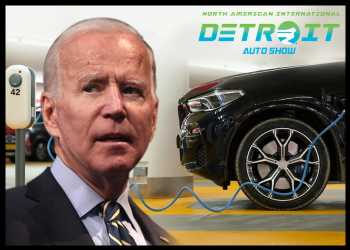President Joe Biden, a self-proclaimed “car guy,” will tour the North American International Auto Show which opens in Detroit, Michigan, Wednesday.
Also known as Detroit Auto Show, it is one of the most influential annual automotive events in the world and a showcase for emerging technologies.
The show is open to public from September 17 to 25.
After touring the stalls, Biden is scheduled to deliver remarks at 1:45 PM ET highlighting his administration’s electric vehicle promotional policies and the electric vehicle manufacturing boom in the United States, according to the White House.
General Motors Chief Executive Mary Barra, Stellantis NV’s CEO Carlos Tavares, its chairman John Elkann, and Ford Motor Co’s executive chairman Bill Ford Jr will greet the President on the auto show floor, Reuters reports.
The Inflation Reduction Act that Biden signed into law last month includes nearly $370 billion in climate and clean energy spending, and expands tax credits available to electric vehicle buyers.
The sweeping law provides incentives for buyers of new and used EVs, credits to help manufacturers retool existing facilities and build new manufacturing in the United States, and grants to deploy zero emission heavy-duty vehicles.
Biden signed an Executive Order recently setting an ambitious target to make half of all new vehicles sold in the country by 2030 zero-emissions vehicles, including battery electric, plug-in hybrid electric, or fuel cell electric vehicles.
At the Detroit Auto Show, leading automobile manufacturers will showcase more models of electric vehicle than ever before for drivers to choose from – including trucks, SUVs and trucks, the White House says.
Stellantis will introduce two new hybrid electric Jeeps and demonstrate the performance of electric in off-road applications. General Motors will show their entire EV portfolio and feature the new electric Equinox. Dozens of other automakers will show off their latest offerings, both in new models and versions of iconic brands.
Overall, the number of available plug-in models has grown to more than 70, with more new models coming up, including affordable options.
In 2021, all major automakers announced their shared aspiration to achieve sales of 40-50 percent of annual U.S. volumes of electric vehicles (battery electric, fuel cell and plug-in hybrid vehicles) by 2030 in order to move the nation closer to a zero-emissions future consistent with Paris climate goals.
The Department of Transportation issued a proposal in August that would, if finalized, require federally funded EV chargers to be built in the United States starting in January 2023 and have more than 55 percent domestic content by January 2024.
This year alone, U.S. companies have announced $13 billion in domestic EV manufacturing – more than triple the investment in 2020. Companies have also announced $24 billion in batteries – more than 28 times the investment in 2020 – and over $700 million to support EV charging.
Source: Read Full Article
-
Blinken Seeks Release Of US Citizens In Call To Russia's Lavrov
-
U.S. Stocks Remain Mostly Higher After Recovering From Initial Weakness
-
Eurozone Private Sector Activity Shrinks Most In Nearly 3 Years
-
Colgate-Palmolive stock likely to trend higher on growth revival hopes
-
Art Laboe Dies: Los Angeles Radio Legend Who Spun & Promoted “Oldies But Goodies” Was 97

